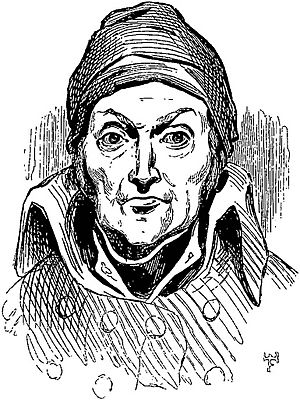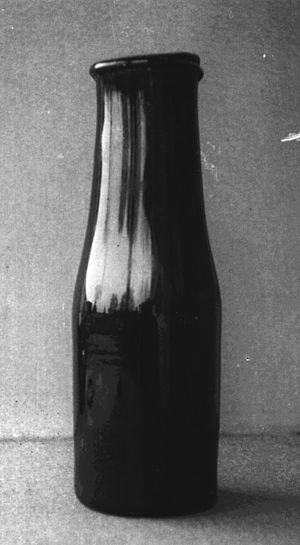Nicolas Appert facts for kids
Quick facts for kids
Nicolas Appert
|
|
|---|---|

Nicolas Appert 1841
|
|
| Born | 17 November 1749 |
| Died | 1 June 1841 (aged 91) Massy, July Monarchy
|
| Nationality | French |
| Signature | |
 |
|
Nicolas Appert (born November 17, 1749 – died June 1, 1841) was a French inventor. He created a way to keep food fresh by sealing it in airtight containers. People often call Appert the "father of Food Science" because of his important work. He was a confectioner, which means he made sweets, and also a chef. His invention was a way "of conserving all kinds of food substances in containers."
Contents
Early Life and Big Ideas
Nicolas Appert was born in Châlons-en-Champagne. He was the ninth of eleven children in his family. His family owned an inn, and he worked there until he was twenty years old. After that, he opened a brewery with one of his brothers.
Later, he worked as a head chef for a count for thirteen years. From 1784 to 1795, Appert was a confectioner and chef in Paris. During this time, he got married and had four children.
Appert lived during the French Revolution, a very big and changing time in France. He faced some difficulties during this period but kept working on his ideas. In 1795, he started trying to find ways to keep food from spoiling. He had success with many foods like soups, vegetables, juices, and jams.
He put the food into glass jars and sealed them tightly with cork and wax. Then, he placed these sealed jars in boiling water. This heating method helped keep the food fresh. People believe that some homemakers already used this idea. However, Appert was the first to do it on a large, industrial scale.
How Appert Kept Food Fresh (Canning)
In 1804, Appert opened the world's first food bottling factory. It was called La Maison Appert, which means "The House of Appert." This factory was in a town called Massy, near Paris. He did this many years before Louis Pasteur proved that heat could kill tiny germs called bacteria.
Appert's method involved filling thick glass bottles with all sorts of food. This included beef, chicken, eggs, milk, and even prepared dishes. He would leave a little space at the top of the bottle. Then, he would seal the cork very tightly using a special tool. To protect the bottle, he wrapped it in canvas. Finally, he put the wrapped bottle into boiling water. He boiled it for as long as he thought was needed to cook the food inside.
Because of Appert's work, the process of canning is sometimes called "appertization." This is similar to "pasteurization," which is another heating process for food.
Even though his methods worked well, Appert had money problems. His equipment was expensive, and he wasn't very good at business. In 1795, the French army offered a prize of 12,000 francs for a new way to preserve food. Appert showed his bottled foods in 1806, but he didn't win the prize right away.
In 1810, the government gave him 12,000 francs. The condition was that he had to share his method with everyone. Appert agreed and published a book that year. His book was called The Art of Preserving Animal and Vegetable Substances. It was the first book of its kind about modern food preservation.
Appert never fully understood the science behind why his method worked. The study of tiny living things, called bacteriology, had not yet been developed. But his method was simple and quickly became popular. In 1810, a British inventor named Peter Durand patented his own method. He used a tin can instead of glass bottles. This led to the modern way we can foods today.
Later Years and Recognition
Despite the money from the government, Appert's financial situation didn't get much better. His factory was destroyed during a war in 1814. With help from the French government, he opened a new factory in Paris. This time, he preserved food in tin cans. He ran this factory for ten years until the government asked him to move in 1827.
Appert's canned goods were very popular. They were especially liked by naval services. His products were much better than the dried and salted foods they used to eat. Cans were sent to other countries, and newspapers praised his work. However, this popularity didn't make him rich. He received medals for his work in 1816 and 1820. But he didn't get the money that came with them until 1824.
In 1828, he opened another factory. He asked to join the Legion of Honour, a special French award, but he was not allowed. He felt insulted by this. In 1836, at 86 years old, he retired. He received a small pension from the government. However, he died without much money in 1841 and was buried in a simple grave.
Honoring Nicolas Appert
Even though he died in poverty, Nicolas Appert's work was very important. He has been honored in many ways:
- In 1955, France released a postage stamp with his picture.
- In 1985, a street in Paris was named Rue Nicolas-Appert in his honor. Many other streets in France also have his name.
- In 1991, a large bronze statue of Appert was put up in his hometown of Châlons-en-Champagne. A plaque was also placed on his birthplace in 1986.
- A room in the Musée des Beaux-Arts et d'Archéologie de Châlons-en-Champagne is dedicated to him.
- There is a high school named after Nicolas Appert in Orvault, France.
- The year 2010 was named Nicolas Appert Year by the French government. This celebrated his important invention. The country of Monaco also issued a postage stamp with Appert on it.
Nicolas Appert Award
Since 1942, a special award has been given out each year. It's called the Nicolas Appert Award. The Institute of Food Technologists gives this award to people who have achieved a lot in food technology.
Study Association
There is a student group at Wageningen University called Nicolas Appert. This group is for students studying Food Technology. Since 1972, they have worked to improve food technology courses. They also organize events for students and people who have graduated. Today, almost 900 students are members of this association.
See also
 In Spanish: Nicolás Appert para niños
In Spanish: Nicolás Appert para niños
 | Selma Burke |
 | Pauline Powell Burns |
 | Frederick J. Brown |
 | Robert Blackburn |


